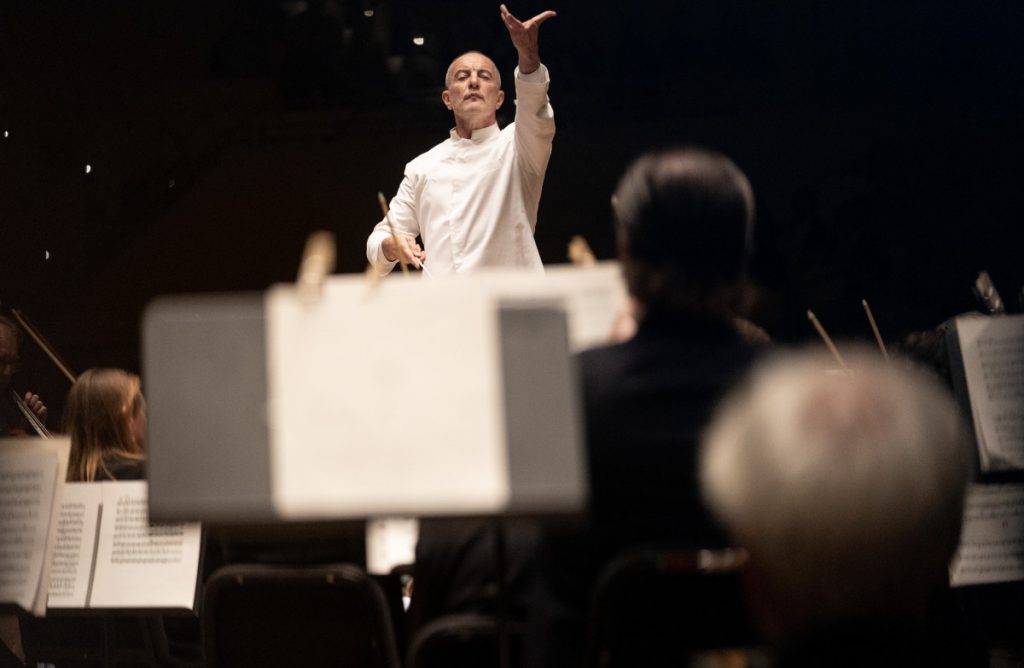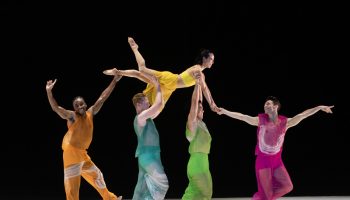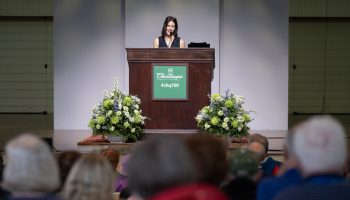
Sarah Russo
Staff writer
Many symphonic concerts pair composers and selections together for a performance of multiple works. But there’s one selection that can stand alone: Anton Bruckner’s Symphony No. 4 in E Flat Major.
Bruckner’s will be the only piece played at 8:15 p.m. tonight in the Amphitheater by the Chautauqua Symphony Orchestra under the baton of Rossen Milanov, music director and principal symphonic conductor. For Roger Kaza, principal horn for the CSO, the piece holds special nostalgia: He chose to play a portion of it many years ago to audition for the CSO.
“I remember being very nervous about it because I’d never played the first part at that point,” Kaza said. “But I love this piece … because it’s got so much horn and so much brass and it’s a very epic work.”
Also referred to as “A Knight’s Tale” with a subtitle of “Romantic Symphony,” Bruckner’s Symphony No. 4 tells the story of knights, the magic of nature and the mystical call of the horn all with ancient hunting connotations.
Composed in 1874, the full piece contains four parts, which the CSO will play in its entirety.
Kaza said Brucker’s composition style isn’t as “connected” as his peers, which sometimes leaves Kaza to wonder: “I don’t know how he got from here to here.” However, he said that may be his only criticism in this piece.
“It’s a little loose, but I find the best way to enjoy it is just be in the moment and then just look at these incredible chord progressions and these beautiful, kind of timeless long stretches of melody,” Kaza said. “It’s a piece you don’t want to be in a hurry for.”
In Symphony No. 4, it’s “almost like (Bruckner’s) improvising on a gigantic orchestral organ … and these amazing, really brilliant chord progressions that ventured pretty far outside of the so-called traditional harmony,” Kaza said.
As Brucker’s symphony takes listeners on a journey throughout nature, Kaza said it made sense Bruckner composed the piece with heavy brass and the French horn, in particular.
“The horn, when you think about it, was really kind of one of the most quintessential Romantic instruments,” Kaza said. “Any time (a composer) wanted to evoke a noble or woodsy or forest scene, they’d always use the horn.”
Bruckner can be a “very polarizing composer” with some critics opining that Brucker’s music is “boring” and “tedious,” Kaza said. On the other side, there are those who “worship” Bruckner’s work as a composer and musician; Kaza, however, fits in a different space. He said Bruckner’s work can be heard all over the world.
“I did a trip down the Grand Canyon and those towering walls all around,” Kaza said. “At one point I thought, ‘This canyon is like a Bruckner symphony in geology.’ … It’s got that same sense of spaciousness and grandeur and just timelessness, which Bruckner evokes.”
Putting together a piece that’s nearly an hour long is no easy task. However, Kaza said, after taking solos or chorale tunes separately, at the end of it all — when the musicians achieve a “cohesive, beautiful sound,” particularly with Bruckner returning to the opening theme — there’s nothing quite as rewarding as a musician.
“It’s satisfying to nail all that stuff,” he said. “It’s just fun to hear how everything culminates at the end of the symphony and he’s finally bringing it home where he started. … Any time we play pieces like that, it’s rewarding just because you’re not going to see it for a while.”




